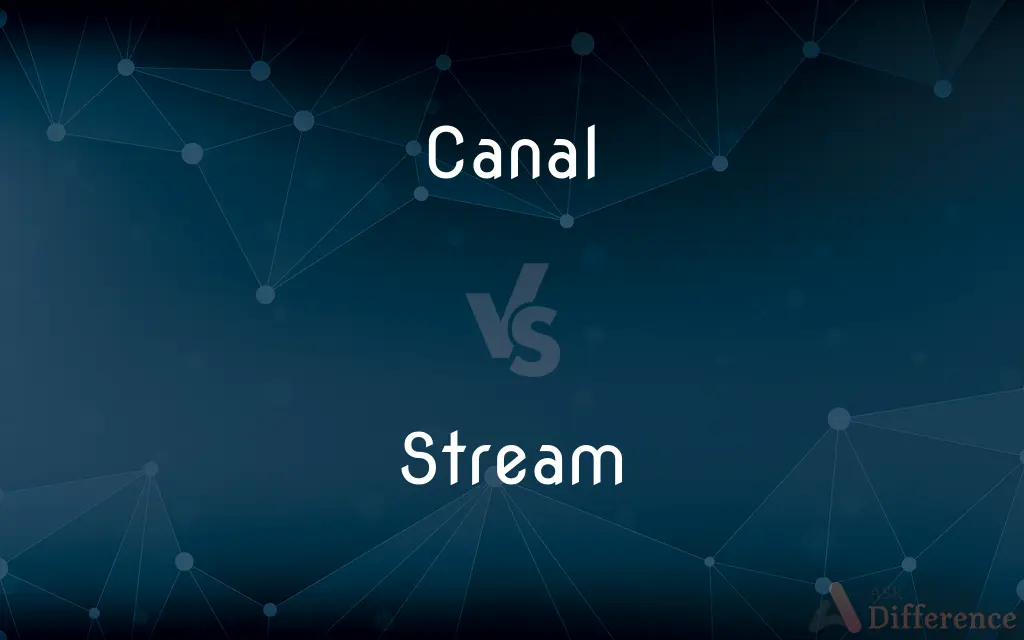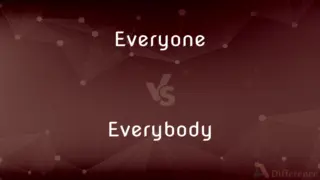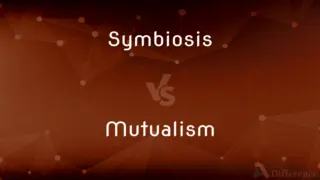Canal vs. Stream — What's the Difference?
By Tayyaba Rehman — Updated on October 27, 2023
A canal is a man-made waterway constructed for transportation or irrigation, while a stream is a natural flowing body of water, typically a small river.

Difference Between Canal and Stream
Table of Contents
ADVERTISEMENT
Key Differences
Canals and streams, while both being associated with water, have distinct differences rooted in their origins and purposes. A canal is a man-made waterway specifically constructed for a range of purposes, such as transportation, irrigation, or drainage. Think of historical achievements like the Suez Canal or the Panama Canal, which facilitated maritime transportation between significant regions. In contrast, a stream represents the untamed spirit of nature. It's a naturally occurring, flowing body of water that can stem from springs or runoff and typically merges into larger bodies of water like rivers or lakes.
From an ecological standpoint, canals and streams also differ. The ecosystem of a stream is shaped by natural processes over time. Streams often support various flora and fauna adapted to the moving water environment. Canals, on the other hand, might not have as diverse an ecosystem, given their artificial nature. The water in a canal is often stagnant or has controlled flow, unlike the free-flowing nature of a stream.
In terms of utility and function, canals play a crucial role in human civilization. From ancient civilizations using canals for irrigation to modern societies leveraging them for transportation, canals have diverse applications. Streams, while not primarily serving human utility, play a vital role in the ecosystem by providing habitats, aiding in groundwater recharge, and supporting biodiversity.
In everyday language, the word 'canal' conjures images of engineered waterways with specific purposes, often accompanied by locks or gates to control water flow. In contrast, 'stream' paints a picture of serenity, depicting nature's course with water flowing through landscapes, cutting across forests, meadows, and other terrains. Both canals and streams, in their respective capacities, highlight the symbiotic relationship between humanity and nature.
Comparison Chart
Origin
Man-made
Natural
ADVERTISEMENT
Primary Purpose
Transportation, irrigation, drainage
Natural flow, habitat, groundwater recharge
Flow Control
Often controlled using locks or gates
Naturally flowing without artificial control
Ecosystem
Might lack biodiversity due to artificial nature
Rich in biodiversity due to natural environment
Example
Suez Canal, Panama Canal
Brooks, creeks
Compare with Definitions
Canal
An artificial channel for conveying water.
The irrigation canal provided water to the arid fields.
Stream
A continuous flow of liquid or gas.
A stream of water gushed from the broken pipe.
Canal
A tubular duct in animals or plants.
The root canal is a part of a tooth's natural cavity.
Stream
A continuous transmission of data, especially audio or video.
I tuned into my favorite music stream online.
Canal
A man-made waterway for transportation.
The Panama Canal connects the Atlantic and Pacific oceans.
Stream
To flow in a continuous current.
Tears began to stream down her face.
Canal
A watercourse built for drainage or irrigation.
The canal prevented the fields from flooding after heavy rains.
Stream
A stream is a body of water with surface water flowing within the bed and banks of a channel. The flow of a stream is controlled by three inputs – surface water, subsurface water and groundwater.
Canal
A constructed channel filled with water used for navigation.
The city's canal was bustling with boats and gondolas.
Stream
A small, narrow river
A perfect trout stream
Canal
Canals are waterway channels, or artificial waterways, for water conveyance, or for servicing water transport vehicles. They carry free surface flow under atmospheric pressure, and can be thought of as artificial rivers.
Stream
A continuous flow of liquid, air, or gas
Frank blew out a stream of smoke
The blood gushed out in scarlet streams
Canal
An artificial waterway constructed to allow the passage of boats or ships inland or to convey water for irrigation
The Oxford Canal
They travelled on by canal
Stream
A continuous flow of data or instructions, typically one having a constant or predictable rate.
Canal
A tubular duct in a plant or animal, serving to convey or contain food, liquid, or air
The ear canal
Stream
A group in which schoolchildren of the same age and ability are taught.
Children in the top streams
Canal
Any of a number of linear markings formerly reported as seen by telescope on the planet Mars.
Stream
(of liquid, air, gas, etc.) run or flow in a continuous current in a specified direction
She sat with tears streaming down her face
Sunlight streamed through the windows
Canal
An artificial waterway or artificially improved river used for travel, shipping, or irrigation.
Stream
Transmit or receive (data, especially video and audio material) over the Internet as a steady, continuous flow.
Canal
(Anatomy) A tube, duct, or passageway.
Stream
Put (schoolchildren) in groups of the same age and ability to be taught together.
In the coming school year, we were to be streamed
Canal
(Astronomy) One of the faint, hazy markings resembling straight lines on early telescopic images of the surface of Mars.
Stream
A flow of water in a channel or bed, as a brook, rivulet, or small river.
Canal
To dig an artificial waterway through
Canal an isthmus.
Stream
A steady current in such a flow of water.
Canal
To provide with an artificial waterway or waterways.
Stream
A steady current of a fluid.
Canal
An artificial waterway or artificially improved river used for travel, shipping, or irrigation.
Stream
A large amount or number moving or occurring in steady succession
A stream of commuters.
A stream of insults.
Canal
(anatomy) A tubular channel within the body.
Stream
A trend, course, or drift, as of opinion, thought, or history.
Canal
(astronomy) One of the faint, hazy markings resembling straight lines on early telescopic images of the surface of Mars; see Martian canals
Stream
A beam or ray of light.
Canal
To dig an artificial waterway in or to (a place), especially for drainage
Stream
Chiefly British A course of study to which students are tracked.
Canal
To travel along a canal by boat
Stream
(Computers) A steady flow of data.
Canal
An artificial channel filled with water and designed for navigation, or for irrigating land, etc.
Stream
To flow in a stream or current.
Canal
A tube or duct; as, the alimentary canal; the semicircular canals of the ear.
Stream
To pour forth or give off a stream; flow
My eyes were streaming with tears.
Canal
A long and relatively narrow arm of the sea, approximately uniform in width; - used chiefly in proper names; as, Portland Canal; Lynn Canal.
Stream
To move or arrive in large numbers; pour
Traffic was streaming by. Fan mail streamed in.
Canal
(astronomy) an indistinct surface feature of Mars once thought to be a system of channels; they are now believed to be an optical illusion
Stream
To extend, wave, or float outward
The banner streamed in the breeze.
Canal
A bodily passage or tube lined with epithelial cells and conveying a secretion or other substance;
The tear duct was obstructed
The alimentary canal
Poison is released through a channel in the snake's fangs
Stream
To leave a continuous trail of light.
Canal
Long and narrow strip of water made for boats or for irrigation
Stream
To give forth a continuous stream of light rays or beams; shine.
Canal
Provide (a city) with a canal
Stream
To emit, discharge, or exude (a body fluid, for example).
Stream
(Computers) To transmit or receive (audio or video content), especially over the internet, in small, sequential packets that permit the content to be played continuously as it is being received and without saving it to a hard disk.
Stream
A small river; a large creek; a body of moving water confined by banks.
Stream
A thin connected passing of a liquid through a lighter gas (e.g. air).
He poured the milk in a thin stream from the jug to the glass.
Stream
Any steady flow or succession of material, such as water, air, radio signal or words.
Her constant nagging was to him a stream of abuse.
Stream
All moving waters.
Stream
(computing) A source or repository of data that can be read or written only sequentially.
Stream
(figurative) A particular path, channel, division, or way of proceeding.
Haredi Judaism is a stream of Orthodox Judaism characterized by rejection of modern secular culture.
Stream
A division of a school year by perceived ability.
All of the bright kids went into the A stream, but I was in the B stream.
Stream
A live stream.
Stream
(intransitive) To flow in a continuous or steady manner, like a liquid.
Stream
(intransitive) To extend; to stretch out with a wavy motion; to float in the wind.
A flag streams in the wind.
Stream
(transitive) To discharge in a stream.
The soldier's wound was streaming blood.
Stream
(Internet) To push continuous data (e.g. music) from a server to a client computer while it is being used (played) on the client.
Stream
A current of water or other fluid; a liquid flowing continuously in a line or course, either on the earth, as a river, brook, etc., or from a vessel, reservoir, or fountain; specifically, any course of running water; as, many streams are blended in the Mississippi; gas and steam came from the earth in streams; a stream of molten lead from a furnace; a stream of lava from a volcano.
Stream
A beam or ray of light.
Stream
Anything issuing or moving with continued succession of parts; as, a stream of words; a stream of sand.
Stream
A continued current or course; as, a stream of weather.
Stream
Current; drift; tendency; series of tending or moving causes; as, the stream of opinions or manners.
Stream
To issue or flow in a stream; to flow freely or in a current, as a fluid or whatever is likened to fluids; as, tears streamed from her eyes.
Beneath those banks where rivers stream.
Stream
To pour out, or emit, a stream or streams.
A thousand suns will stream on thee.
Stream
To issue in a stream of light; to radiate.
Stream
To extend; to stretch out with a wavy motion; to float in the wind; as, a flag streams in the wind.
Stream
To send forth in a current or stream; to cause to flow; to pour; as, his eyes streamed tears.
It may so please that she at length will streamSome dew of grace into my withered heart.
Stream
To mark with colors or embroidery in long tracts.
The herald's mantle is streamed with gold.
Stream
To unfurl.
Stream
A natural body of running water flowing on or under the earth
Stream
Dominant course (suggestive of running water) of successive events or ideas;
Two streams of development run through American history
Stream of consciousness
The flow of thought
The current of history
Stream
A steady flow (usually from natural causes);
The raft floated downstream on the current
He felt a stream of air
Stream
The act of flowing or streaming; continuous progression
Stream
Something that resembles a flowing stream in moving continuously;
A stream of people emptied from the terminal
The museum had planned carefully for the flow of visitors
Stream
To extend, wave or float outward, as if in the wind;
Their manes streamed like stiff black pennants in the wind
Stream
Exude profusely;
She was streaming with sweat
His nose streamed blood
Stream
Move in large numbers;
People were pouring out of the theater
Beggars pullulated in the plaza
Stream
Rain heavily;
Put on your rain coat-- it's pouring outside!
Stream
Flow freely and abundantly;
Tears streamed down her face
Stream
A small, flowing natural body of water.
We picnicked by the side of a gentle stream.
Stream
A current within a larger body of water.
Fish often swim against the stream to lay eggs.
Common Curiosities
What is the primary purpose of a canal?
A canal is mainly constructed for transportation, irrigation, or drainage.
Is the Suez Canal a natural waterway?
No, the Suez Canal is a man-made waterway connecting the Mediterranean Sea to the Red Sea.
Can streams be found in cities?
Yes, streams can run through urban areas, though they may be affected by urban development.
How does a stream form?
A stream naturally forms from springs, runoff, or other sources and flows into larger water bodies.
How do locks in canals work?
Locks in canals are used to raise or lower boats between different water levels by filling or emptying chambers with water.
Can streams dry up?
Yes, streams can dry up due to various reasons, including seasonal changes or human activities.
Why are canals important for transportation?
Canals provide water routes, facilitating the movement of goods and people, often connecting significant water bodies or regions.
Are streams freshwater sources?
Yes, streams are typically freshwater sources, though their purity can vary based on environmental factors.
Are canals always straight?
No, while many canals are straight for engineering purposes, they can also have curves or bends.
Do streams always flow into rivers?
While many streams flow into rivers, some may flow into lakes or other water bodies.
Can you navigate a boat in a canal?
Yes, many canals are designed for boat navigation, often with specific size limits.
What's the difference between a stream and a river?
Streams are typically smaller than rivers, and while both are naturally flowing water bodies, rivers often have a more significant water volume.
Do streams support biodiversity?
Yes, streams provide habitats for various flora and fauna, supporting rich biodiversity.
Can canals be used for recreation?
Yes, some canals are popular for boating, fishing, and other recreational activities.
Are there ancient canals still in use today?
Yes, some ancient canals, built for irrigation or navigation, are still in use or have historical significance.
Share Your Discovery

Previous Comparison
Everyone vs. Everybody
Next Comparison
Symbiosis vs. MutualismAuthor Spotlight
Written by
Tayyaba RehmanTayyaba Rehman is a distinguished writer, currently serving as a primary contributor to askdifference.com. As a researcher in semantics and etymology, Tayyaba's passion for the complexity of languages and their distinctions has found a perfect home on the platform. Tayyaba delves into the intricacies of language, distinguishing between commonly confused words and phrases, thereby providing clarity for readers worldwide.














































